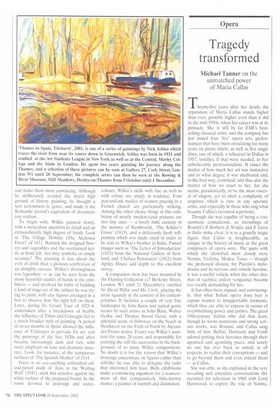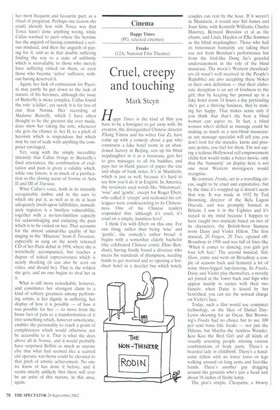Tragedy transformed
Michael Tanner on the unmatched power of Maria Callas
Twenty-five years after her death, the reputation of Maria Callas stands higher than ever, possibly higher even than it did in the mid-1950s, when her career was at its pinnacle. She is still by far EMI's bestselling classical artist, and the company has just issued four `live' opera sets, performances that have been circulating for many years on pirate labels; as well as five single discs, one of which, a rehearsal in Dallas in 1957, testifies, if that were needed, to her unbelievable professionalism. It raises the matter of how much her art was instinctive and to what degree it was meditated and, in the best way, contrived; and thus also the matter of how we react to her, for she seems, paradoxically, to be the most visceral of singers, yet to elicit a complexity of response which is rare in any operatic artist, and especially in those who sing what became Callas's favoured repertoire.
Though she was capable of being a consummate comedienne, as recordings of Rossini's Ii Barbiere di Siviglia and II Turco in Italia make clear, it is as a grandly tragic figure that Callas is irreplaceable, as unique in the history of music as the great composers of opera were. The parts with which she identified most closely were Norma, Violetta, Medea, Tosca though she professed distaste for Puccini's melodrama and its nervous and volatile heroine, it was a useful vehicle when the other dramas of sacrifice and/or vengeance became too vocally demanding for her.
It has often been argued, and convincingly, that what Italian opera does best is expose women to insupportable torments, which they are able to express in scenes of overwhelming power and pathos. The great 19th-century Italian who did that least, though he wrote numerous and strong serious works, was Rossini, and Callas sang little of him. Bellini, Donizetti and Verdi adored putting their heroines through their agonised and agonising paces, and surely no one has ever been so suited, in all respects, to realise their conceptions — and to go beyond them and even extend them — as Callas.
She was able, as she explained in the very revealing and articulate conversations she recorded for television in 1968 with Lord Harewood, to exploit the role of Norma, her most frequent and favourite part, as a ritual of purgation. Perhaps one reason she could identify less with Tosca was that Tosca hasn't done anything wrong, while Callas warmed to parts where the heroine has the anguish of having committed a serious misdeed, and then the anguish of paying for it, and so in that double suffering finding the way to a state of sublimity which is unavailable to those who merely have suffering visited on them, or even those who become 'active' sufferers, without having deserved it.
Again, her lack of enthusiasm for Puccini may partly be put down to the lack of stature of his heroines, although the issue of Butterfly is more complex. Callas found the role 'a killer', yet surely it is far less of one than Norma. Her recording of Madama Butterfly, which I have often thought to be the greatest she ever made, does show her taking the role, whenever she gets the chance in Act II, to a pitch of heroism which is stupendous but which may be out of scale with anything the composer envisaged.
Yet, sung with the simply incredible intensity that Callas brings to Butterfly's final utterances, the combination of exaltation and pain is given a validity which, while one listens, is as much of a purification as the closing scene of Norma or Acts II and III of Traviata.
What Callas's voice, both in its instantly recognisable timbre and in the uses to which she put it, as well as in its at least adequately dwelt-upon fallibilities, immediately registers is a limitless vulnerability, together with a no-less-limitless capacity for acknowledging and enduring the pain which is to be visited on her. That accounts for the almost animal-like quality of her singing in the `Miserere' from Ii Trovatore, especially as sung on the newly released CD of her Paris debut in 1958, where she is wretchedly accompanied, but reaches a degree of naked expressiveness which is nearly shocking (it can also be seen on video, and should be). That is the wildest she gets, and no one begins to rival her at It, What is still more remarkable, however, and constitutes her strongest claim to a kind of solitary greatness among performing artists, is her dignity in suffering, her display of how it is possible — of how it was possible for her — to move from the brute fact of pain to a transformation of it into something which, however unwelcome, enables the personality to reach a point of completeness which would otherwise not be accessible to it. That is what she does above all in Norma. and it would probably have surprised Bellini as much as anyone else that what had seemed like a scarred old operatic war-horse could be elevated to that pitch of artistic achievement. No one we know of has done it before, and it seems utterly unlikely that there will ever be an artist of this stature, in this area, again.



































































































 Previous page
Previous page